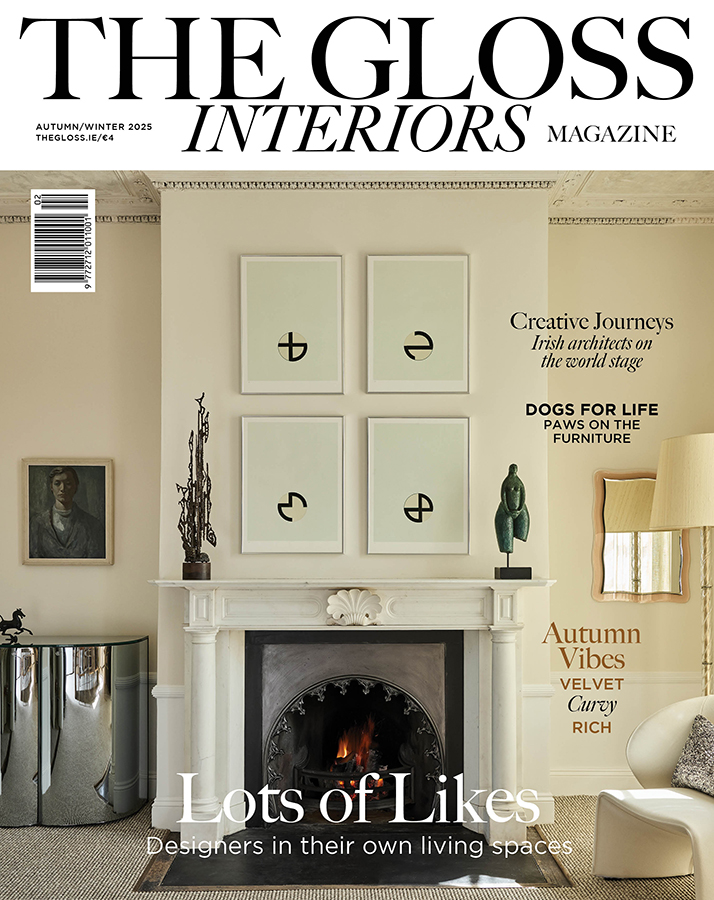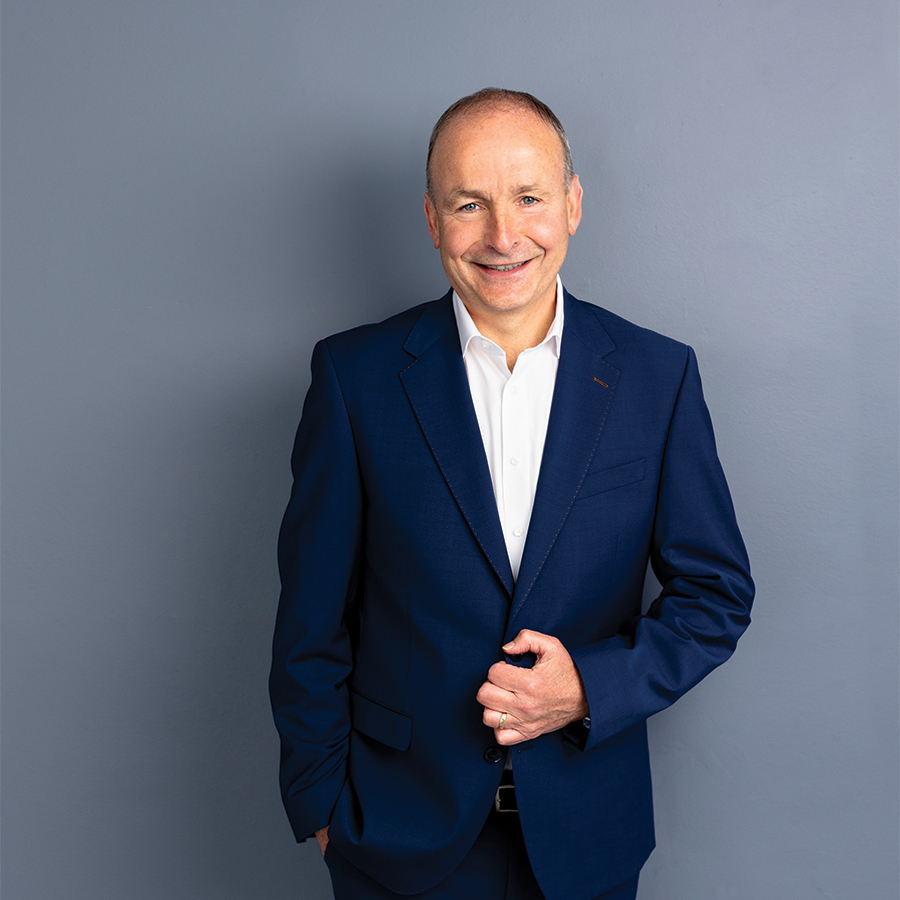Taoiseach Micheál Martin was born and raised in Cork city, where he still lives, with his wife Mary, and their three children, Micheál Aodh, Aoibhe and Cillian.
HOW WOULD YOU DESCRIBE YOUR PARENTS? Loving. They were part of a generation who had aspirations for their children. Education was everything. My father was the biggest influence in my life. He was a very successful sportsman, a boxer for Ireland, and he had a connection to politics through Jack Lynch. My mother was typical of mothers of her day but the qualities I learned from her were to be kind and non-judgmental.
WHAT DEFINED YOUR CHILDHOOD? We grew up in Turner’s Cross in Cork. If you ever read Paddy Clarke Ha Ha Ha, it was similar to that. The area was working class – bus drivers, bus conductors, mental health nurses, Ford’s, Dunlop’s. It was an aspiring community who wanted their kids to move on in life and it was a very happy childhood.
WHERE DID YOU GO TO SCHOOL AND WHAT WAS ITS IMPACT ON YOUR LIFE? It was Bunscoil Chríost Rí for primary and then Coláiste Chríost Rí for secondary. Two teachers were a particular influence. Tom Lande in Sixth Class, who was way ahead of his time. I was making radio programmes at twelve years of age, and he created political groups in the classroom and we’d all be shouting at each other. Maybe we didn’t do that well in the exams, but he prepared us for broader life. I had Tony Power, an English teacher, in secondary. He’d tell us to watch Seven Days – the Prime Time of its day – and we’d talk about it the next day. That got me interested in current affairs in a serious way.
WERE YOU A REBELLIOUS TEENAGER? I wasn’t. My mother always said I was a fella who was a good compromiser at home, avoided conflict. I was happy in myself.
WHAT DID YOU THINK YOU’D GROW UP TO BE? A history teacher. I had a particular interest in the subject and my father always taught us informally about history. As a bus driver, he did Bus Éireann tours for Americans and learned the history of every part of Ireland. I was a history teacher for five or six years.
DID YOUR PARENTS INFLUENCE YOUR DECISION TO ENTER POLITICS? My mother would have preferred if I had stayed on in teaching. Myself and my twin brother were the first in the family to go on to third-level education. My parents left school after sixth class. So they were thrilled when I went to UCC [for an Arts BA and an MA in Political History]. My mother thought I had a great academic career ahead of me.
“At the moment there’s no hunger to retire or weariness. For me, activity matters, and if you just stop suddenly, I’m not sure that’s a good thing. I feel I have more to give and I’m still interested…”
HAVE YOU EVER REGRETTED LEAVING TEACHING? I enjoyed it, but no. There was a draw to get involved in politics and once I got elected in the local election [in 1989] I was totally committed, all in.
WHAT’S YOUR BIGGEST STRENGTH AT WORK? I can analyse something and cut to the chase really quickly. That’s important in decision-making and I like decision-making.
CAN YOU EVER IMAGINE CALLING ANOTHER POLITICIAN A “POINTLESS HUMAN BOLLARD”, AS BORIS JOHNSON ONCE CALLED KEIR STARMER IN THE HOUSE OF COMMONS? No. I believe language is important in politics. I don’t like coarse language. I don’t like personal assassination. Fight people on the politics.
HAVE YOU MISSED A LOT OF FAMILY LIFE BECAUSE OF YOUR CAREER? The kids say I have, when they are trying to make me feel guilty. One regret I have is the Saturdays. I filled them up with clinics. But then, August [when the Dáil isn’t sitting] was good in the early years with the kids.
YOU’VE BEEN TAOISEACH, DOES IT FEEL LIKE YOU’VE ACHIEVED IT ALL? No, not at all. It was a great honour but there’s much more to be done and I want to be Taoiseach again.
YOU WERE 64 IN AUGUST, DO YOU EVER THINK OF RETIREMENT? Eventually. At the moment, there’s no hunger to retire, or weariness. For me, activity matters, and if you just stop suddenly, I’m not sure that’s a good thing. I feel I have more to give and I’m still interested.
WHAT HAS BEEN THE TOUGHEST TIME IN YOUR LIFE? Undoubtedly Ruairí’s death [at five weeks from a cot death] in 1999 and Léana’s [at the age of seven, having suffered a heart condition] in 2010. Ruairí’s death shook the optimism out of me and then Léana’s loss was devastating.
DID THE LOSS OF YOUR TWO CHILDREN ALTER HOW YOU HAVE LIVED SINCE? It gives you a broader perspective on other things that happen in life. There’s nothing worse than this, so you don’t lose your head over other things. Mary and I always say that the other kids picked us up because we had to carry on, but it never leaves you and it never will, and it comes back when you least expect it.
WHAT HAVE BEEN THE IMPORTANT FEMALE RELATIONSHIPS IN YOUR LIFE? My mother was the anchor and she was fond of me. Without Mary, my wife, I wouldn’t be where I am. She’s fantastic. We’ve had challenges in our life but we’ve been there for each other right the way through. Aoibhe is the next most important – I don’t get through a day without being reminded to do A, B, C and D.
YOU’D LIKE PEOPLE TO REGARD YOU AS … Kind. No airs and graces.
YOUR FRIENDSHIPS ARE FOR THE MOST PART … Outside politics. That’s a touchstone to life itself. I have my old schoolfriends and Mary and I also have very strong friendships with our group in Courtmacsherry, where her people are from. Close friendships sustain us through life. I have friends in politics too, but it’s a different kind of friendship.
YOUR EXERCISE ROUTINE INCLUDES … A lot of walking. The legs are as strong as ever, but from the waist up, not so much. The former Secretary of State for Northern Ireland, Chris Heaton-Harris, was boasting to me about the weights he was doing, it was quite impressive, and my son, Micheál Aodh, keeps telling me I have to improve my core body strength and get the weights going. So I’m trying to resolve that this autumn.
HOW DO YOU DEAL WITH STRESS? Walking is the real de-stressor, and swimming in the sea. If you put your head down into the sea, you’re a different person after it.
DO YOU WISH YOU WERE IN CORK MORE? Yes. You could never not want to be in Cork more.
WHERE IS YOUR HAPPY PLACE? West Cork. I can be there in an hour from Cork but it’s a huge shift in mentality.
YOU MOSTLY READ … Novels and some history. I just finished Colm Tóibín’s Long Island and I’m now reading The Madness by Fergal Keane.
WHAT DO YOU COOK? I’m a salad person. It’s not laziness, I just love them. When I’m in Cork at the weekend, I go to the market in Douglas or the English Market and hoover up my provisions for the week in Dublin. I don’t need the big, hot dinner every day, but every now and then you get a yen for it, and I do love a fillet steak with a tomato.
DO YOU EVER FULLY SWITCH OFF? Ah, the odd night or two, yeah. The portfolio I’m in means things can break out any time but it’s not a burden. To me, a holiday is no meetings. Being on the phone is not work, I can handle that. If I’m walking as well and not tied to the office, I can handle that.
SEE MORE: Artist Maser on Pain, Paint and Peace





